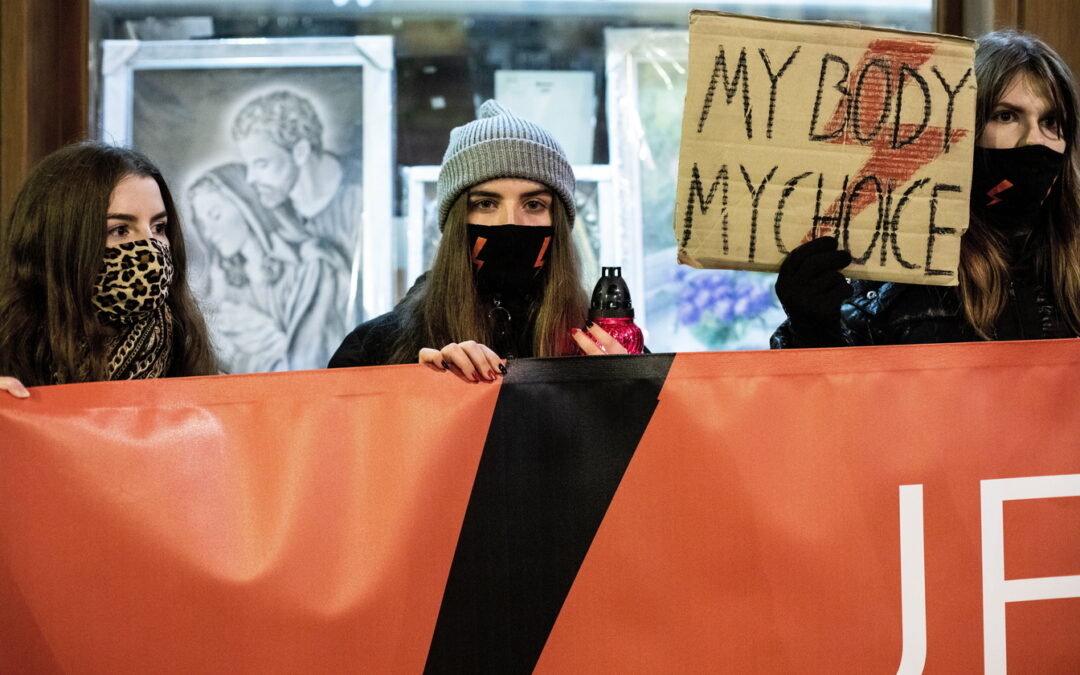The European Court of Human Rights has rejected a complaint by eight Polish women who claimed to be victims of their country’s recently introduced near-total ban on abortion. Around 1,000 such cases have been submitted to the ECHR, and this is the first time it has ruled on one.
“The court found that the applicants had failed to provide any convincing medical evidence proving that they had been at real risk of being directly affected by [the abortion law],” said the ECHR in a statement announcing today’s decision.
Decision A.M. v. Poland – eight abortion rights cases inadmissiblehttps://t.co/f1eBLuDNZK#ECHR #CEDH #ECHRpress pic.twitter.com/hFkHjROZ0N
— ECHR CEDH (@ECHR_CEDH) June 8, 2023
The eight women – who were born between 1980 and 1993 – submitted their complaint in 2021 after the entry into force of an October 2020 ruling by Poland’s Constitutional Tribunal (TK) that found abortions due to the diagnosis of severe foetal abnormalities to be unconstitutional.
Given that under Poland’s then-existing abortion law, which was already one of the strictest in Europe, such abortions made up around 98% of legal terminations, the TK’s decision effectively resulted in a near-total ban on legal abortion in Poland.
The ECHR notes that the eight women lodged their application to the Strasbourg court using a pre-filled form posted on the internet by FEDERA, a leading women’s rights group. Two of them noted that they were pregnant at the time of submission while two others said they have medical conditions increasing the risk of birth defects.
The other four said they were either planning pregnancies or had stopped trying to become pregnant after the TK ruling because they feared not receiving adequate medical care if their foetuses were diagnosed with serious abnormalities.
A 37-year-old wife and mother of three died in Poland after being forced to carry a dead fetus for over a week.
Prosecutors launched an investigation, but activists blame the death on the country's near-total abortion ban that went into effect last year. https://t.co/RQ8Ce9zW61
— Alanna Vagianos (@AlannaVagianos) January 27, 2022
The women argued that the strict new abortion rules violated their rights under article 8 of the European Convention on Human Rights (which pertains to respect for private and family life) by forcing them to carry pregnancies to term even in the case of foetal abnormalities.
However, in a unanimous decision issued today by the seven judges considering the case, the ECHR rejected the complaint. It noted that only in very exceptional circumstances can someone claim to be a victim due to the risk of a future violation of their rights.
None of the women provided “reasonable and convincing evidence of the likelihood that a violation affecting her personally would occur”, found the court. “Mere suspicion or conjecture was insufficient.”
While the women claimed that their life or health could be endangered by the abortion law, the ECHR noted that abortion is still legally permitted in Poland if a pregnancy endangers a woman’s life or health.
Two doctors have been charged over the death of a pregnant woman in hospital last year that prompted mass protests by those who blamed the tragedy on Poland's new near-total ban on abortion https://t.co/sk2D7Er8eM
— Notes from Poland 🇵🇱 (@notesfrompoland) September 7, 2022
The ECHR therefore found that the complaints made by the women “were hypothetical, and were too remote and abstract for them to arguably claim to be “victims”…It followed that the applications had to be declared inadmissible in their entirety”.
The court noted, however, that it still has around 1,000 ongoing applications relating to the restriction of abortion rights due to foetal abnormalities in Poland.
“This is only the first shot of this battle,” Jakub Jaraczewski, a legal expect at Democracy Reporting International, told broadcaster Deutsche Welle. “Many of the [other cases] concern applicants whose situation was not so hypothetical.”
Jaraczewski noted that “applications from women who were refused an abortion or from the relatives of those who died as a result of a refusal” would be admissible to the court. There have been a number of cases since 2021 of pregnant women dying in hospital that relatives have blamed on the abortion law.
“Thanks to the abortion law, there’s nothing they can do…”
The final messages of a pregnant 30-year-old, whose recent death in a Polish hospital has been blamed on #Poland’s near-total abortion ban, have been made public by her mother. https://t.co/p2fV9nPPKc pic.twitter.com/cS4pJr2Ahw
— Andrew Stroehlein (@astroehlein) November 5, 2021
Proponents of the law say that such cases are in fact the result of medical malpractice by doctors, because the law still allows abortions to take place when a pregnancy threatens a woman’s life or health.
However, others argue that the law has made doctors fearful of facing prosecution for carrying out terminations, which leads them to avoid or delay such procedures, thereby putting women at risk.
The TK ruling introducing a near-total abortion ban in 2020 sparked Poland’s largest protests since the fall of communism. Opinion polls have consistently shown that the ban is opposed by a large majority of the public. However, the conservative ruling party has rejected legislative efforts to liberalise the law.
Poland’s health ministry has issued guidance to hospitals on treating complications in pregnancies following a recent death.
More cases have emerged involving women either dying or being put at risk due to reluctance of doctors to terminate pregnancieshttps://t.co/38MBsbzYZQ
— Notes from Poland 🇵🇱 (@notesfrompoland) November 8, 2021
Main image credit: Jakub Orzechowski / Agencja Wyborcza.pl

Daniel Tilles is editor-in-chief of Notes from Poland. He has written on Polish affairs for a wide range of publications, including Foreign Policy, POLITICO Europe, EUobserver and Dziennik Gazeta Prawna.




















